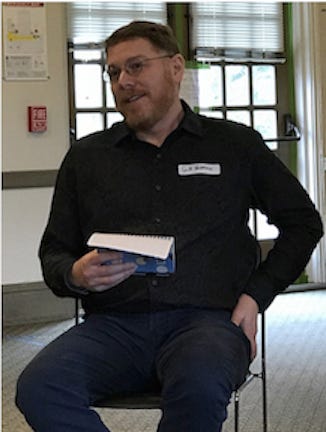Leading up to the 2016 election and in those chaotic months afterward, I honed my skills as a prolific click-tavist. I’m not too humble to admit that I achieved elite-level status.
Few were faster than me when it came to posting articles on Facebook about the injustices occurring across our country. No Donald Trump meme was too insignificant for a share. I even expanded my click-tavism to Twitter — opening new audiences for my sardonic musings in support of progressive causes.
Despite these efforts, nothing changed. Trump was inaugurated. Neil Gorsuch was confirmed to the Supreme Court. Environmental safeguards implemented by the Obama Administration were methodically undone. “Is no one moved by my memes?” I wondered.
It seemed that more direct action was required. This is where the Sister District Project came in. SDP’s commitment to state races intrigued me — and not simply because state legislatures impact issues that matter to me and other progressives. State races are key to reversing the gerrymandering that has immunized Republican incumbents from accountability. Additionally, the bench of future national progressive candidates will be built at the local and state levels. And, we as a party need to wake up to the reality that funding state candidates, especially early in their candidacies and in the final weeks of their elections, are essential to victory.
I volunteered to be a District Captain for the Sister District Northwest Oregon team because I wanted to get out from behind my computer and into the neighborhoods in my community. So, I checked the “do you want to be a District Captain?” box on the Sister District volunteer signup form. I didn’t know what would happen next.
Well, not much happened next. I stayed current with what Sister District was doing, but I was a bit lost as to what it meant to be a District Captain. Fortunately, another DC in my area called together a meeting of volunteers like me who checked that box. We met at a coffee shop, strangers all, and hatched a plan to move forward. The plan essentially was to either do something or give it up.
I didn’t want to give it up. The stakes are too high. I decided action was required, which meant reaching out to other volunteers who signed up for Sister District. I was nervous. I thought, “Will anyone respond? Will they wonder ‘who the heck are you and why are you bothering me?’” I was insecure about my lack of experience in political movements. At the same time, I was extremely confident in Sister District’s mission and the imperative of flipping red to blue in the states.
This confidence inspired me to reach out not just to Sister District volunteers but to other activist groups in the area, hoping they also would be inspired to support our mission. I searched Facebook for local activist groups (like Indivisible) and sent messages to their page administrators, essentially inviting myself to their meetings to talk about Sister District. I honestly didn’t know whether they’d respond, either.
But respond they did. Others in my community were eager to support state candidates — not just candidates in Oregon but in neighboring Washington State and faraway Virginia. Even a two-minute elevator pitch about Sister District’s mission and the importance of supporting state candidates all across the country was sufficient to rally volunteers to support campaigns in ways they had never imagined.
And, as it turned out, there are lots of groups out there trying to find their way in this political moment, struggling with the same challenges about how to organize and sustain volunteer engagement. I met scores of progressive volunteers like me who were seeking concrete ways to give voice to their concerns. Even where Sister District’s mission was not an exact fit for these groups, Sister District’s efforts to support specific candidates in key races inspired all kinds of volunteers and provided opportunities for these developing groups to build infrastructure around sustained action. Whether writing postcards or textbanking, volunteers came together to advance progressive causes; and having done so, were eager and even impatient for the next opportunity.

The excitement of other volunteers is fuel for the work of District Captains. So, too, are the connections we make with leaders just like us, who have been motivated to devote much time out of their already busy, complicated lives to resisting, promoting, and organizing in the name of progressive values and initiatives. This outreach and the opportunity to speak with volunteers and leaders from across my region led to the best unintended consequence of being a District Captain.
Community.
I have met, been inspired by, and learned from a number of local activists I would not have met if I hadn’t become a District Captain. Many of these individuals have become friends, and there have been countless times when we have held one another up, rescued one another from calamity, and fostered connections that have made all of us stronger as a whole.
Sister District Project needs leaders, but leaders lead in many important ways. Maybe you are skilled at organizing, strategy, public speaking, graphic design, or social media communication. Or perhaps you are simply someone with time to spare for postcard shopping and post office runs. Whatever your skill set or untapped potential, Sister District Project needs you to step up and join with other District Captains in your region and across the country to keep the Blue Wave going.
Believe me, you won’t regret it.


